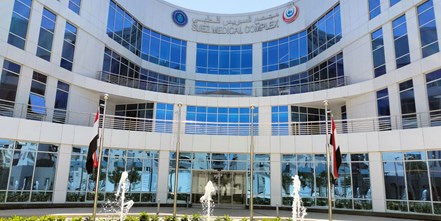



Chairman of the Egypt Healthcare Authority: Launching 7 new clinical departments at the Suez Medical Complex, including "Spinal Surgery", "Vascular Surgery", "Cardiology", "Chest", "Neurology", "Ophthalmology", and "Stroke Unit."
Chairman of the Egypt Healthcare Authority: The Suez Medical Complex, the first of its kind in the Canal Governorates, was built on an area of 35,000 square meters at 3 billion Egyptian pounds.
Chairman of the Egypt Healthcare Authority: The Suez Medical Complex represents a transformative step in healthcare services for the people of Suez Governorate and the Canal region.
Chairman of the Egypt Healthcare Authority: The Suez Medical Complex operates with a capacity of 427 beds, 109 intensive care units, 64 outpatient clinics, 70 dialysis machines, 16 operating rooms, and 54 incubators. For the first time, a digital platform for Building Management Systems (BMS) is launched using Artificial Intelligence (AI).
Chairman of the Egypt Healthcare Authority: More than 700,000 medical and therapeutic services have been provided at the Suez Medical Complex to 300,000 patients to date, with 375,000 diagnostic services, 5,500 advanced surgeries, 702 interventional catheterizations, and 309 surgeries performed for the first time.
Chairman of the Egypt Healthcare Authority: The Suez Medical Complex continues to provide advanced medical services with expanding use of modern technology to enhance healthcare quality.
Dr. Ahmed El-Sebki, Chairman of the Egypt Healthcare Authority and General Supervisor of the Universal Health Insurance Project, has announced the introduction of 7 new clinical departments at the Suez Medical Complex, located in Suez Governorate, one of the first phase governorates for the implementation of the Universal Health Insurance system.
Dr. El-Sebki explained that the newly added clinical departments include "Spinal Surgery", "Vascular Surgery", "Cardiology", "Chest", "Neurology", "Ophthalmology", and the "Stroke Unit". This development is part of the Authority’s continuous efforts to provide advanced, comprehensive medical services to the people of Suez and the Canal region.
Dr. El-Sebki added that the Suez Medical Complex is the first of its kind in the Canal Governorates, built on an area of 35,000 square meters with a total cost of 3 billion Egyptian pounds. This project represents a major leap in healthcare services in the region, aiming to improve the quality of services provided and meet the health needs of citizens efficiently.
Dr. El-Sebki pointed out that the complex operates with a large capacity, including 427 beds, 109 intensive care unit beds, 64 outpatient clinics, 70 dialysis machines, 16 operating rooms, and 54 incubators.
Dr. El-Sebki also mentioned that the medical complex includes an advanced digital platform for Building Management Systems (BMS) using AI technology. This platform, the first of its kind in the Authority's healthcare facilities, allows for effective monitoring of occupancy rates, secure control of the central air conditioning system, real-time monitoring of resource consumption, compliance with social distancing and infection control measures, and provides alert systems for medical gas pressures and temperature sensors, contributing to the highest safety and quality standards within the complex.
To date, Dr. El-Sebki stated, the Suez Medical Complex has provided over 700,000 medical and therapeutic services to nearly 300,000 patients, including approximately 375,000 diagnostic services, 5,500 advanced surgeries, 702 interventional catheterizations, and 309 surgeries performed for the first time. This reinforces the role of the complex as a cornerstone in improving the quality of healthcare in the Canal region.
Dr. El-Sebki confirmed that the Authority will continue to support and develop healthcare services using the latest medical technologies to improve the quality of services, achieve the highest levels of efficiency in serving citizens, and align with Egypt’s 2030 Vision, which aims to achieve sustainability and leadership in the healthcare sector in Egypt.